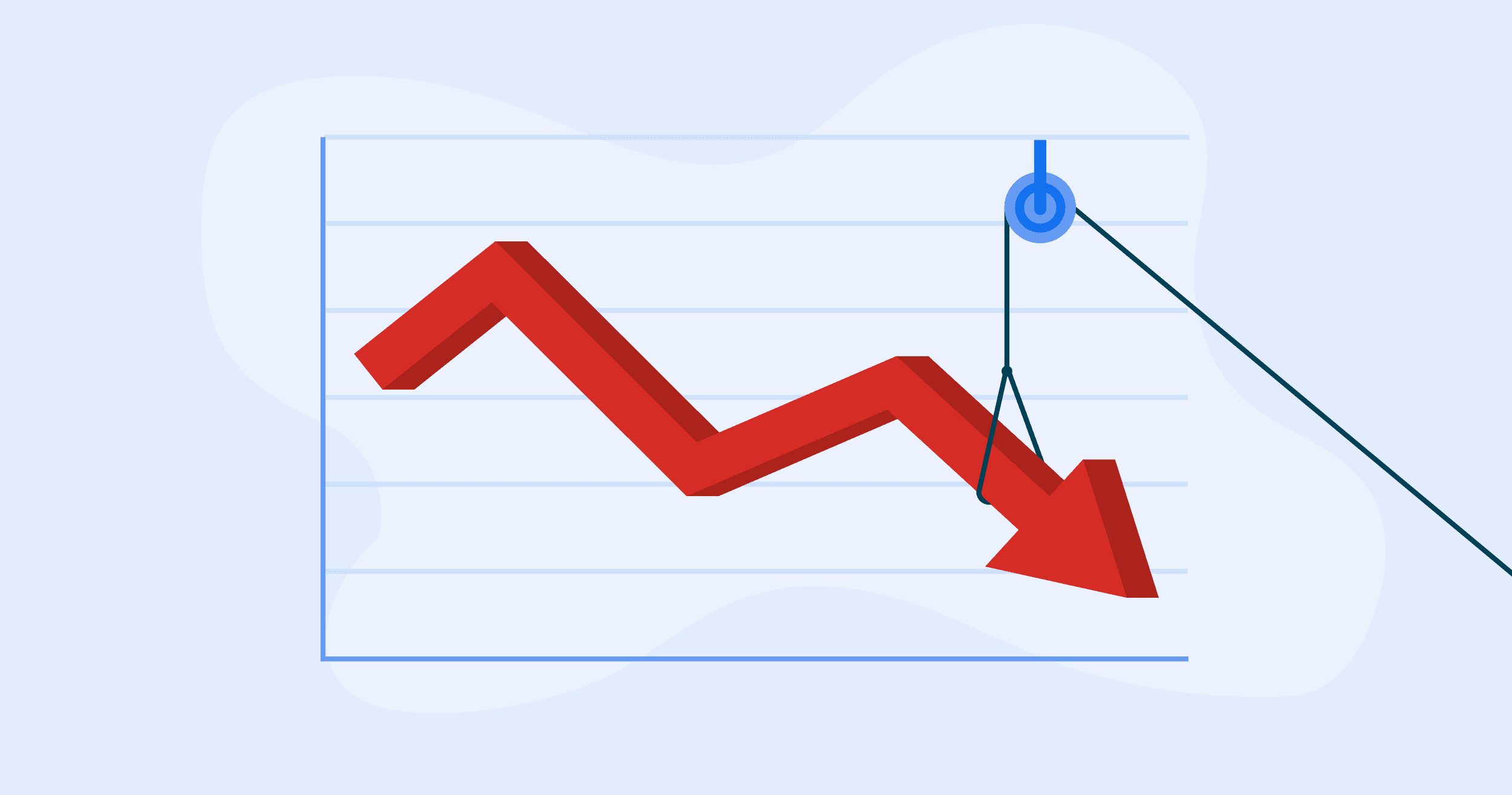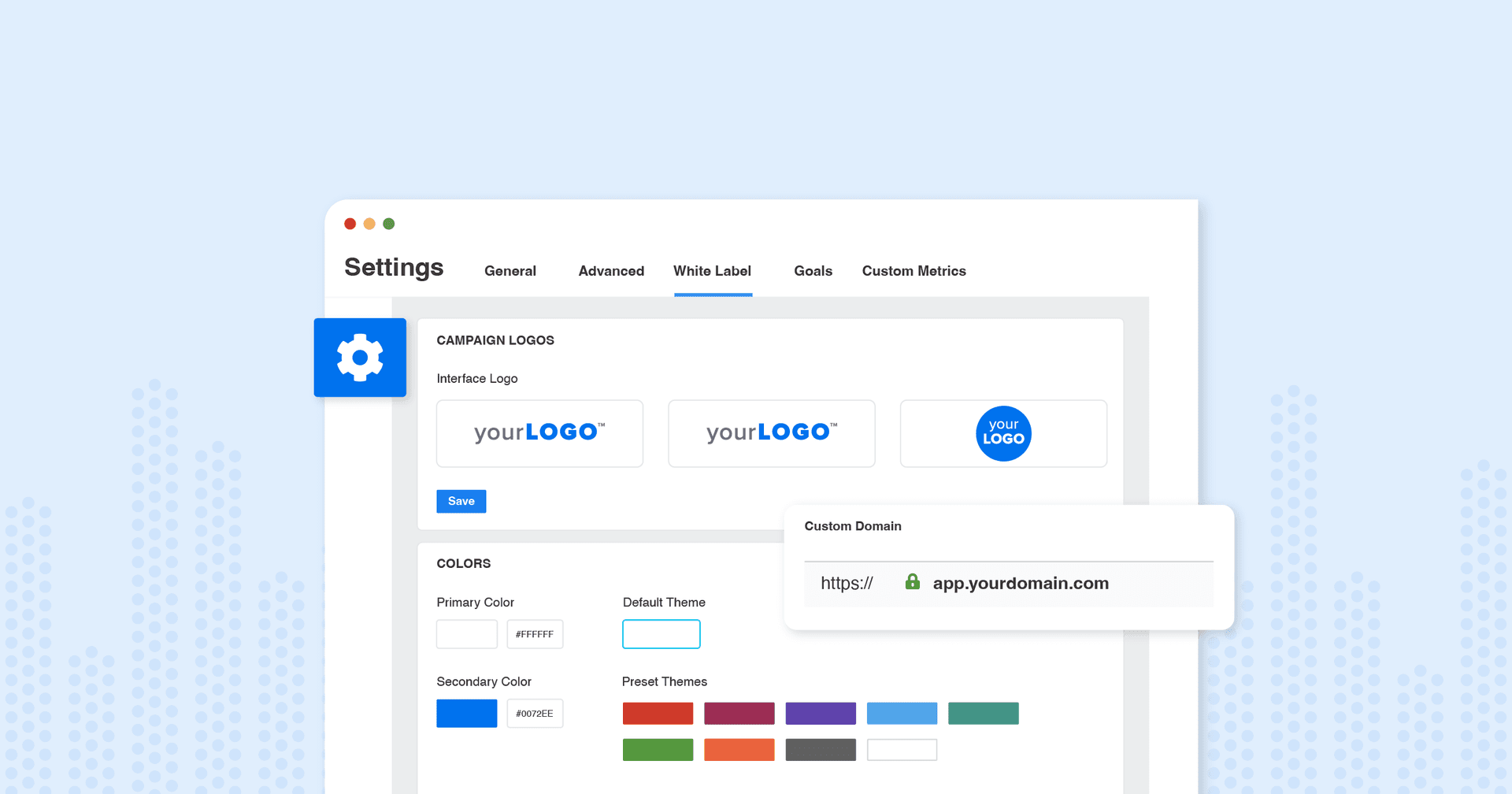Table of Contents
Table of Contents
- Is the US in a Recession?
- What Would a Recession Mean for Marketing Agencies?
- The Different Ways a Recession Impacts Agencies–and Their Clients
- How To Recession-proof Your Marketing Agency
- Reinforce Why They Need To Keep Growing During a Recession
- Agency Pricing During a Recession
- Cutting Back on Non-Essential Marketing Agency Expenses
- Selecting the Right Marketing Agency Clients
- Picking up New Clients During Economic Downturns
- Expand Globally
- Negotiate Better Terms With Marketing Agency Suppliers
- Finding New Sources of Revenue
- Making Your Marketing Agency More Efficient
- Create Cash Reserves
- Summary and Key Takeaways
7,000+ agencies have ditched manual reports. You can too.
Free 14-Day TrialQUICK SUMMARY:
Recession-proofing a marketing agency involves implementing strategies to withstand economic downturns. This guide shares ten actionable steps to ensure resilience during a recession, such as diversifying services, renegotiating supplier terms, and building cash reserves. Learn how to maintain operational efficiency and turn challenges into opportunities.
It's no secret that the economy is in a state of flux. With predictions of a recession on the horizon–and some even saying that we are already, officially, in a recession–many marketing agencies are worried about what this could mean for their business.
This guide will outline ten strategies to help recession-proof your marketing agency and ensure that you survive–and thrive–during the economic turmoil. A well-prepared marketing agency can not only ride out these uncertain times but turns them into an opportunity to become a leaner, more efficient marketing machine.
Is the US in a Recession?
The National Bureau of Economic Research (NBER) is the organization that formally declares when a recession occurs in the United States. The NBER’s definition of a recession is "a significant decline in economic activity spread across the economy, lasting more than a few months, normally visible in real GDP, real income, employment, industrial production, and wholesale-retail sales."
They have not yet said whether we are officially in a recession, although many economists believe otherwise. In fact, some signs point to difficult economic times ahead.
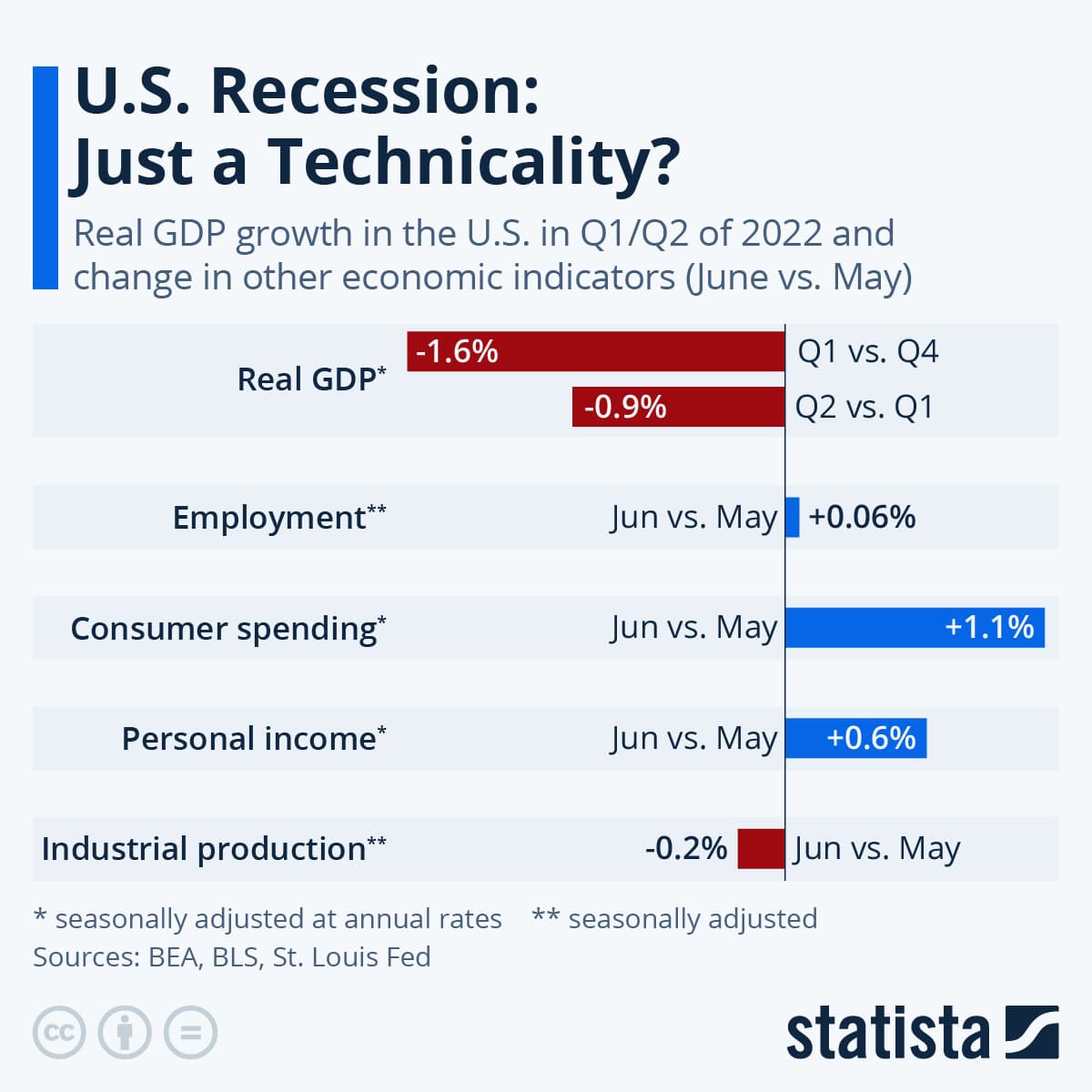
Unfortunately, even the threat of a recession can lead to clients tightening their marketing belts. And if you're running a marketing agency, it's important to be prepared for the possibility of a recession–even if we're not technically in one yet.
What Would a Recession Mean for Marketing Agencies?
In short, a recession would mean both you and your client will spend less on marketing and advertising.
“The recession will make taking the leap for a start-up all the more riskier, and for others, it will make it more difficult,” says Joseph Anthony from Imageworks Creative.
Anthony believes that “missed business opportunities and lack of confidence, funding, and motivation among start-ups, small businesses, and medium businesses” are the biggest dangers of a recession to a marketing agency.
Companies everywhere would cut back on their marketing budgets, as we saw happen during the Great Recession in 2007-2009. According to The Economist, global ad spending fell by around $60 billion during that time.
Employment supported by U.S. consumer spending also declined by an estimated 3.2 million jobs between 2007 and 2010.
More recently, the short-lived Covid-19 recession in 2020 still had a devasting impact on the advertising industry. According to Magna, advertising revenue declined by $25 billion in December 2020, a 4.2% drop compared to 2019.
During that time, a Spendesk survey revealed the areas where businesses were most likely to cut during a financial crisis. Marketing and advertising were projected to be the hardest hit, and the results are difficult to digest for anyone in the advertising industry.
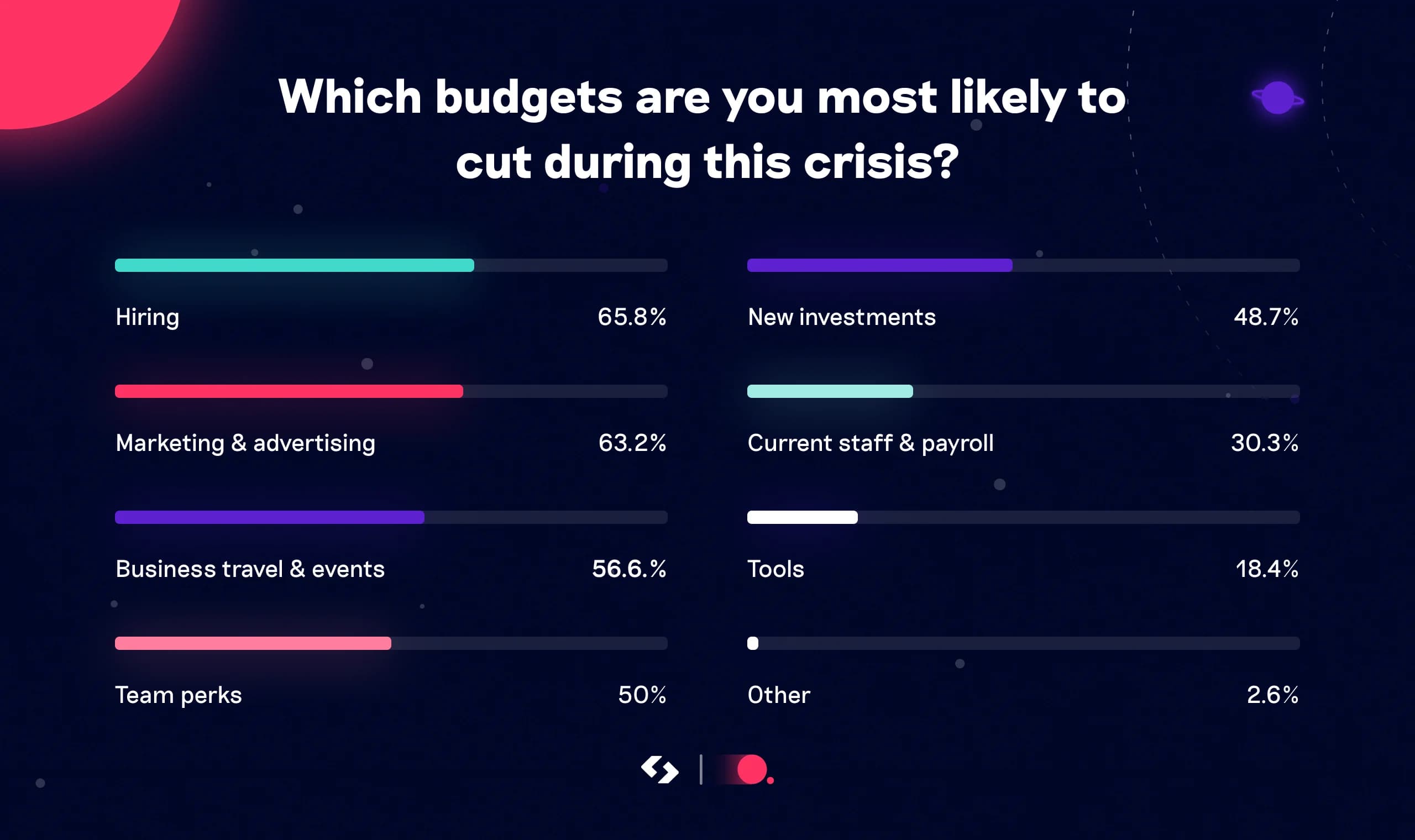
“Agencies can lose a significant amount of recurring revenue in a recession and have a difficult time scaling down labor costs,” says Ryan Kelly, CEO of Pear Analytics. “So you’re faced with letting team members go to maintain margin, or eat into your reserves and try to ride out the storm. It’s not a fun place to be.”
But it's not all doom and gloom. Difficult times can also lead to opportunities for smart and savvy marketing agencies.
"We have encountered more people getting engaged with the technology and wanting to be on the web." adds Camilo Garzon, CEO of neocami. For them, these uncertain times are opening up new opportunities by helping their clients prepare for a possible recession.
While some might be tightening their belts in advance of a possible recession, others are increasing their marketing investments to take advantage of a gap in the marketplace or expanding into new opportunities, like what happened with the Covid-19 rush to eCommerce.
With the right approach, marketing agencies can ride the tide of economic fluctuations and come out the other end better, stronger, and more efficient than ever before.
The Different Ways a Recession Impacts Agencies–and Their Clients
A recession often leads to less consumer spending for two main reasons. They either have less money to spend because the economy has already impacted them, or they are worried that they will be impacted and are creating their own buffer against impending difficulties.
When consumer spending decreases, businesses suffer a loss of income. And when businesses suffer a loss of income, it leads to the necessary reduction of expenses to stay afloat.
“As a full-service agency that focuses on many industries and doesn't specialize in only one or a few, the overall economy affects all of our clients and their plans for growth," offers David Sardinha, VP/COO of The Marketing Machine. "Many clients see marketing budgets as a discretionary expense... very few see it as an opportunity to capture market share."
A recession can impact a marketing agency and its clients in a few different ways. Here are four of the most common:
1. Companies Spend Less on Marketing
As we mentioned earlier, one of the most common impacts of a recession is that companies spend less money on marketing and advertising. This means that agencies, especially those who bill based on a PPC Markup model, will see a decline in revenue as clients cut back on their budgets.
2. Agencies Lay off Employees
Another common repercussion of recession is that agencies may have to lay off employees due to a decline in revenue. This can be devastating for agency employees, who may lose their jobs, and the agencies themselves, who may have to downsize to stay afloat.
3. Clients Cancel Contracts or Defer Projects
This is especially bad news for agencies counting on certain projects for most of their income. When companies are facing tough financial times, they may put their marketing plans on hold until things improve. Not only are they often worried about the financial outlay of these bigger projects, but the troubled economy could negatively impact the results, reducing the ROAS of any new initiative.
4. Clients Switch to In-House Teams or Cut Back on Agency Services
“The biggest danger to a marketing agency facing a recession is losing existing clients”, says Dan Delmain, founder of :Delmain.
A recession can result in a decline in income for agencies and fewer jobs for employees. However, it is important to note that the opposite may also occur. If companies are forced to lay off their own internal marketing teams, they may turn to an outsourced marketing agency to fill that gap.
In business, your current customer is your cheapest customer. When faced with economic uncertainty, our focus shifts to client retention. It’s an all-hands-on-deck approach to avoid disruption to existing client relationships. - Dan Delmain
How To Recession-proof Your Marketing Agency
Even if you take the necessary precautions, a recession can still have a major impact on your marketing agency. It's important to take a critical look at your agency's operations and make sure that you are doing everything possible to streamline your business and reduce costs.
Here are ten strategies to help you weather the storm:
Keep clients calm and reinforce the need to grow. Streamlining your workflow doesn’t necessarily mean cutting back on client communication. Regular client communication is critical to keeping your clients happy. It’s just a matter of managing your agency in a more cost-effective way with the right agency tools.
Review your pricing structure. Can you afford to lower your rates temporarily to be more accessible to your clients?
Cut back on nonessential expenses. Do you really need that new office chair? Or can you automate some key processes like client reporting to save time and money?
Be more selective about the clients you work with. Can you afford to turn down projects that aren't a good fit for your agency?
Capitalize on the situation if you can. Is it possible for your agency to pick up new clients if something happens to the competition during this period? Keep a close eye on your competitors with automated tools like a rank tracker to move up the SEO ranks.
Expand globally. Unless we're looking at a global recession, the economic downturn will impact certain countries more than others. With remote work on the rise, this is an opportunity to target different markets while working from home. There are plenty of great remote work tools that can make this happen effectively.
Negotiate better terms with your suppliers. Can you get a discount on your marketing materials? Or maybe rent space at a reduced rate?
Find new sources of revenue. Are there other services you should offer clients? Or new markets you could target?
Evaluate your business efficiency. Is there a more efficient way to run your agency for fewer billable hours?
Create cash reserves. Do you have enough funds on hand to ride out the storm? If not, do what you can now to create that buffer.
Reinforce Why They Need To Keep Growing During a Recession
For a lot of clients, the knee-jerk reaction is that they need to cut spending. And, as you can see from this list, that’s also on the top of your to-dos.
However, your clients need to make sure that cuts now won’t hurt the momentum. There are some programs like paid ads where it is much easier to turn things off for a brief period, while other programs require continuous momentum to maintain their growth trajectory.
“Some clients are increasing their investments because their competitors are pulling back.” - Dan Delmain
The Dangers of Cutting Back
If your clients want to cut spending in these areas too soon or too deeply, there are some things they should know first.
SEO Takes Time To Grow
SEO can sometimes be like pushing a rock up a hill. If you let go and that rock rolls all the way to the bottom, you have to start over again. If your client stops investing in SEO, their competitors may overtake them in the search engine rankings, resulting in lost business.
Social Media Has a Cumulative Effect on Business
Social media is similar to SEO in the sense that it takes time. More engagement means more followers, shares, and potential customers. Because users churn off social platforms regularly, your client can’t count on that group of followers to still be engaged–or even on the platform–when they come back.
Email Marketing Is Too Cost-effective To Cut
Email marketing is one of the most cost-effective marketing methods and should be maintained, even during uncertain economic times. Email allows you to reach a large audience at a low cost, so losing out on that wouldn’t be cost-effective.
Be Wary of Pulling the Plug on PPC
Although paid campaigns such as Google Ads and Facebook Ads are easier to turn on and off (or ramp up and down) during financial difficulties, each time you do so, you lose valuable campaign optimization time that can help improve client campaigns. Plus, if your client isn’t in front of potential customers, their competitors could snap up their customers. At the very least, a client should always maintain brand spending to protect the people who are searching specifically for their company, product, or service.
Don’t Forget the Tax Breaks
In times of stress, companies sometimes forget about the future impact of near-term decisions, such as when tax time rolls around. It may be helpful to remind them that most marketing expenses–as long as they are directly related to your client’s business activities–are tax deductible. Cutting back now could lead to a larger tax bill down the road.
Agency Pricing During a Recession
Recession-proofing your marketing agency doesn't mean that you have to sacrifice profitability. In fact, it's quite the opposite. Reviewing your agency pricing structure and ensuring you are charging what you are worth is a key part of recession-proofing your business. But be careful not to price yourself out of the reach of struggling businesses.
There is a difficult balance between managing your own agency's profit margins and being considerate of the challenging financial situation a client may be facing.
“What we are seeing is more price-conscious buyers who are not choosing us because of our premium pricing.” - Ryan Kelly, Pear Analytics.
But that doesn’t mean you should instantly jump to slashing your prices. Instead, as Kelly suggests, consider providing “tools and masterclasses to offer more low-cost solutions to prospects who can’t afford premium done-for-you services.”
Although client retention and new client onboarding remain important, you need to ensure that you are charging enough to cover your costs and turn a profit. If you find that you are consistently discounting your rates or charging less than the market rate, it's time to take a hard look at your pricing structure.
Once your base rates are settled, you have more flexibility to offer temporary relief to your hardest-hit customers to keep them on your roster. But be careful not to discount so deeply that your agency ends up losing money.
Cutting Back on Non-Essential Marketing Agency Expenses
When a recession hits, every marketing agency feels the pinch. One way to recession-proof your agency is by cutting back on non-essential expenses as long as it is done the right way.
Over-cutting, especially doing so too early, severely limits a firm's potential for growth in the future. However, a reluctance to cut expenses can put your survival into question.
According to WorkingPoint, business expenses fall into some common categories, with the largest expenses falling in staffing costs, professional fees, office space, and random expenses lumped into other expenses.
Take a close look at your budget and see where you can cut back. Maybe you can get by with fewer staff members by automating some key processes. Whatever it is, find ways to save money to generate a larger cash reserve that will help you stay afloat during tough economic times.
8 Agency Expenses To Reconsider
Here are eight of the most common expenses that you should think about fine-tuning:
Rent/mortgage–If your agency has migrated to a mostly remote workforce, do you still need that oversized office space? Downsizing or finding a business partner to share the space could be a way to help carry that burden.
Utilities–Take a close look at your energy bills. Are there ways to reduce your consumption? Even during the best economic times, being more environmentally friendly is always a good idea.
Staff salaries–This is always the toughest cut for a business owner, but redundancies could be optional during times of a business downturn. As you prepare for a downturn it could help to look at the less critical functions in your agency and how they could be consolidated under essential resources.
Travel–In the Zoom era, perhaps it's best to skip that conference in Europe. Travel is possibly one of the easiest expenses to trim back on during difficult times. And that way, you don't have to worry about lost luggage either.
Office Expenses–If you were thinking about remodeling the agency office space, or replacing all of the furniture, it might be worth considering a delay on that project until the economy has stabilized.
Subscriptions–Is your marketing tech stack just a little bit bloated? It's fun having all of those bells and whistles, but now might be the time to thoroughly review your tool subscriptions. Are there some you can eliminate or at least pause for a few months?
Training–Although it's good to keep your team at the top of their game, you might want to consider delaying any team training for a while or opt for free courses. Or send a core representative from the agency who can learn the principles and then teach the rest of the staff. Teaching someone else is also a great way to reinforce your own learning.
Corporate Perks & Events–We all enjoy celebrating milestones with our colleagues or showing off our company swag, but it might be a good idea to put those quarterly team dinners on hold, just for a little while.
While it may not be possible, or wise, to cut all of these expenses, every little bit helps. So take a close look at your budget and see where you can make some reductions. It could make all the difference for your agency during a recession.
We’re not that far out from the COVID pandemic: try to capitalize on efficiencies already forcibly set in place. For example, Imageworks expanded its operations and has worked 100% remotely since the pandemic started: “We now work nationally and have hired talent in VA, CT, and TX, and accept clients from across the USA. While this may not be 100% recession-proof yet, we will just have to see and continue to make updates.”
Once you've created the inventory of possible savings, assign a timeline to each, including things that should be cut right away to help increase your agency's cash reserves, as well as things that should be cut depending on how long this downturn lasts.
Try to focus the initial cuts on things that are the easiest to resume following the recession, such as travel, training, and corporate events. Other cuts, such as reducing staff members, can be held in your back pocket in case they are needed later.
Selecting the Right Marketing Agency Clients
To recession-proof your marketing agency, it's important to be selective about the clients you work with. Not every client is going to be a good fit for your business–and that's okay!
This isn't a concept that is exclusive to times of economic turmoil, but it becomes even more important during difficulties. In recessionary times, it's important to focus on quality over quantity.
Work with clients in your areas of specialization. And if a project doesn't seem like a good fit for your agency, don't be afraid to turn it down and walk away from a bad deal.
Beyond the agency-client fit, there are some other areas you might want to consider when it comes to onboarding new clients.
Diversify Your Client Portfolio To Mitigate At-Risk Sectors
The right kind of clients includes having a mix of niches that are less likely to be impacted by a recession.
While there is no certain way to recession-proof your marketing agency, there are a few things to help mitigate the risks. One way to do this is by diversifying your client portfolio.
This means that you should try to have a mix of clients that come from different industries. That way, if the recession impacts one sector, your agency won't take as big of a hit.
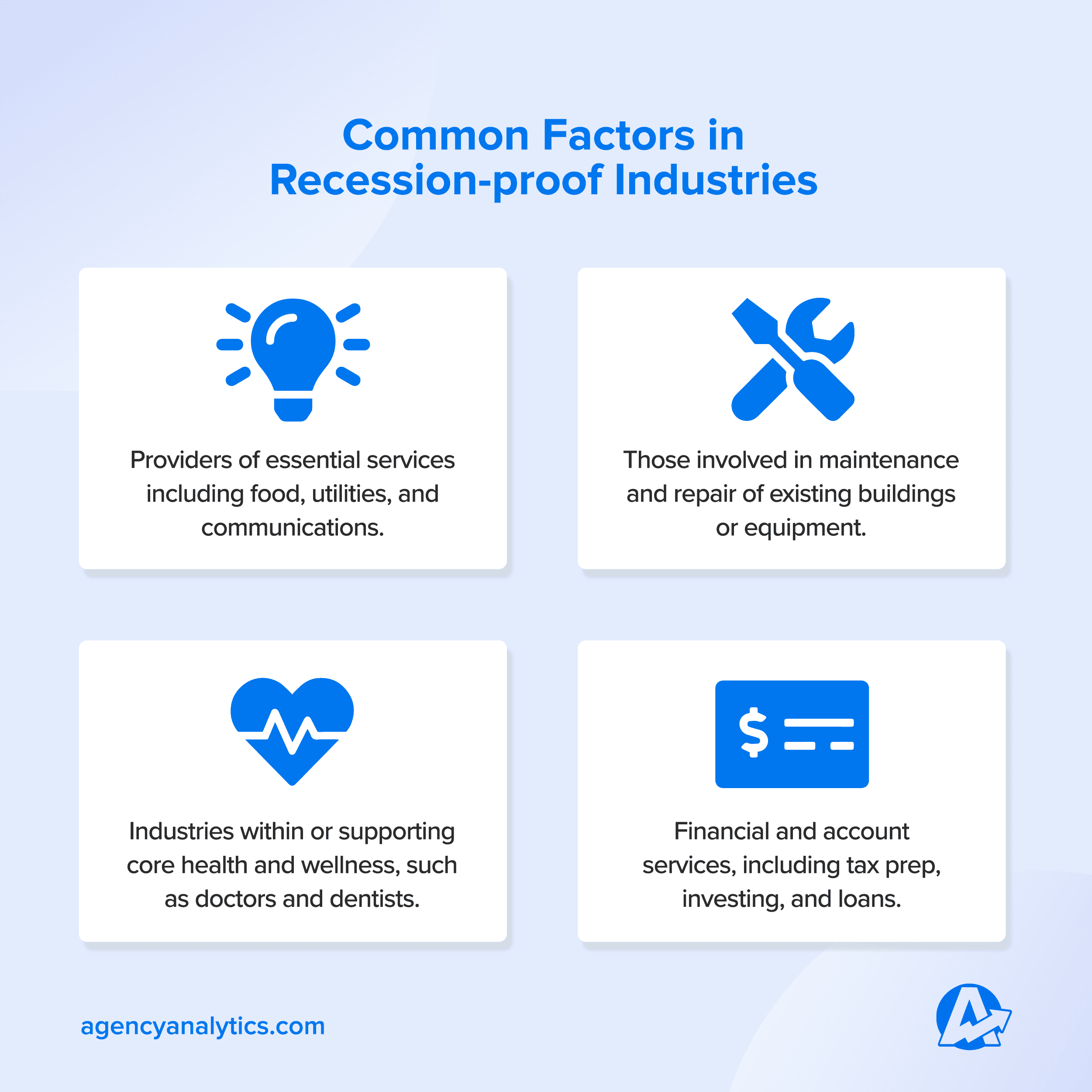
Even though it's impossible to predict exactly how the economy will fare in the coming years, there are a few sectors that are likely to remain recession-proof.
12 Examples of Recession-proof Industries
Healthcare–This industry is always in demand, regardless of the economy. Healthcare will always fall into one of the essential categories that typically carry on with business-as-usual during a recession.
Energy–The energy sector is another example of an industry that is recession-proof. People will always need to heat their homes and power their businesses. Although, a focus on green energy continues to light the way.
Pet care & adoption–During tough economic times, people may be less likely to splurge on luxury items, but the pet industry usually sees a boost in adoption rates during a recession.
Financial and accounting services–Few things put a focus on personal or business finances quite like an economic recession. That's why financial services continue to be in demand, even during tougher economic times.
Baby products–There's always a requirement for baby necessities, such as clothing, formula, and diapers. Infant products are about as recession-proof as it gets. Although it's important to note that the birth rate declined following the 2007 recession, you may see a post-recession impact on these businesses and can plan ahead for this by positioning your agency to attract the right type of clients.
Real estate–Real estate is also an essential part of the economy. Everyone needs a place to live, work, and do business. This means that real estate will always be in demand, no matter what the economy is like.
Education–Education is another recession-proof sector. People will always need to learn, no matter what the economy looks like. In fact, recessionary times are often when people have to go back and learn new job skills to tackle the next phase in their careers.
Funeral services–Life, and death, wait for no one and do not concern themselves with economic fluctuation. Any business based on certainty is much better positioned to make it through a recession.
Food and beverage–Can you think of a more recession-proof industry than food? People will always need to eat–no matter what the economy looks like. This means that food and beverage companies are always in demand, although take care regarding the type of food and beverage clients because retail outlets such as grocery stores will likely be more recession-proof than restaurants.
Repairs and renovations–Although new home builds tend to slow during a recession, home repairs and renovations are always going to be necessary, no matter what the economy looks like. In fact, during recessionary times, people often put off big purchases and instead focus on fixing up their homes and doing DIY projects.
Technology–Although this sector was hit hard in the stock markets recently, it's still a strong contender to weather the recessionary storms.
Nonprofit organizations–Nonprofit organizations are always going to be in demand because they provide essential services to those who need them the most. And during recessionary times, there is an even greater demand for services that help people get back on their feet.
“We’ve been doubling down on building up our client base in the dental industry because we feel they are more recession-proof than other industries,” notes Delmain.
If your marketing agency includes clients from some of these steadier industries, you are in a better position to weather any economic storms that come your way.
On the flip side of the coin, there are industries that are typically harder hit by a recession, if the one from 2007 is any indication. When you combine the CNBC report following the Great Recession with some of today's economic forecasts, 10 industries appear to rise to the top as those who are most likely to feel the pinch if this downturn continues.
10 Industries Most Likely To Be Affected By a Recession
Retail
Restaurants and Bars
Tourism and Hospitality
Automotive and Recreational Vehicles
Home Furniture
Office Supplies
Marketing and Advertising (yup, that's you)
Oil and Gas
Real Estate Development
New Home Construction & Building Materials
If your client portfolio is heavily invested in any of those specific industries, it might be worth diversifying your client base sooner rather than later.
Want some help on how to find a niche that’s right for your agency?
Also, consider targeting a mix of small businesses, mid-sized businesses, and enterprise clients. That way, if one sector takes a hit during an economic downturn, your agency is not left high and dry.
Agency Tip: If you have clients in these at-risk industries, consider having a strategy call to discuss ways for your agency to help recession-proof their business. By keeping their business stable during economic uncertainty, you are not only helping them, but you are also more likely to keep them as clients.
Picking up New Clients During Economic Downturns
Even in the best of times, marketing agencies experience client turnover. But during an economic downturn, this rate increases exponentially as businesses tighten their belts and cut back on expenses.
Rather than focusing exclusively on your own agency's turmoils, keep an eye on your competition as a way to get more clients. If they start to experience financial difficulties or close up shop, be ready to swoop in and pick up their clients.
“For the savvier and prepared entrepreneurs, the recession creates an opportunity for them to compete with potentially struggling agencies.” - Joseph Anthony, Imageworks Creative.
Not only will this help expand your agency's client portfolio and increase market share, but you'll be helping businesses that may have been left in the lurch by an unexpected shutdown.
Expand Globally
While the U.S. economy might be heading into a prolonged recession, there are other economies around the world that are still thriving or–at the very least–may not be hit as hard.
By expanding your agency's reach to include global clients, you insulate yourself against economic downturns in specific countries or regions. And as an added bonus, you get to experience the excitement and challenge of working with clients from all over the world.
Although there are nuances to master for every country around the world, the core principles of digital marketing strategies remain consistent whether your client is in Los Angeles, California, or Syndey, Australia.
Negotiate Better Terms With Marketing Agency Suppliers
For your marketing agency to survive a recession, it's important to keep costs low. One way to do this is by negotiating better terms with your suppliers.
It's quite possible that your clients will have this same conversation with your agency, so you might as well be proactive and try to trim back expenses where you can.
If you have a good relationship with your suppliers, they may be willing to give you a discount on your marketing materials, even if it's only temporary. Or maybe they'll be willing to extend payment terms so that you have more time to pay them back. Whatever it is, don't be afraid to ask for what you need.
Don't assume that costs are fixed, especially if you have any contracts up for renewal. We all know that acquiring a customer is far more expensive than retaining clients, so companies are often willing to trim the total cost to keep a high-value customer from churning.
Finding New Sources of Revenue
During an economic downturn, marketing agencies need to find new sources of revenue. This can mean branching out into new services or markets.
If you're unsure where to start, think about the needs of your current clients. Is there a service you could offer them to help them during these tough times? Or are there other businesses in complementary industries that you could target?
Expand Service Offerings
For example, if you are already handling Paid Search Marketing for a client, consider whipping up an SEO proposal to manage their organic keyword ranking as well. If you're already an AgencyAnalytics client, use the free SEO proposal template, and it takes practically no time at all to run a quick SEO site audit and use tools to track the rankings of some of their most profitable PPC keywords. Once that's done, flip that into a professional proposal in minutes.
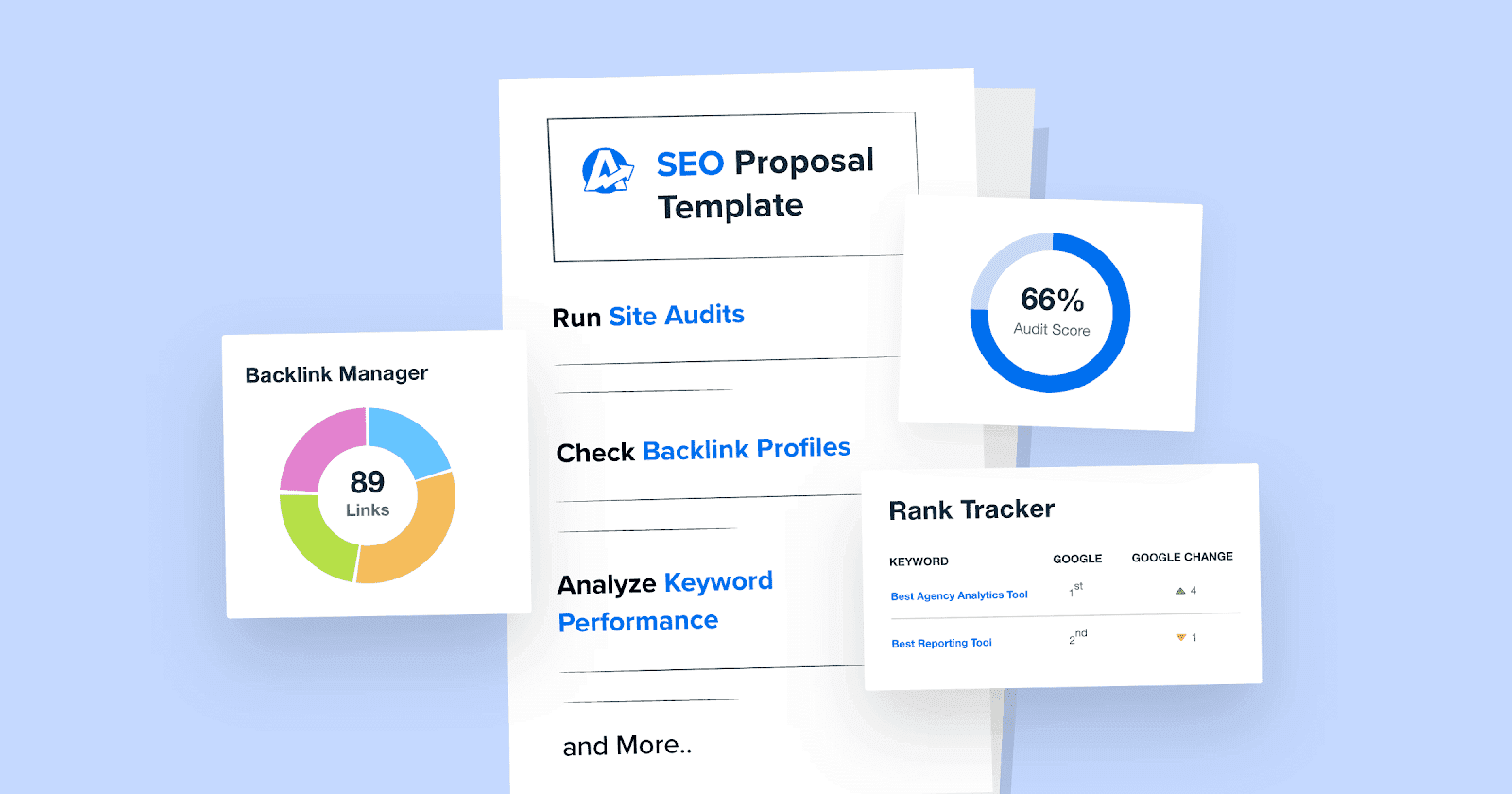
Another strategy is to focus on recurring revenue streams. This could mean offering things like monthly retainers or subscription-based services to generate monthly recurring revenue. That way, even if project work dries up during a recession, you'll still have some income coming in each month.
Look at what you can do that provides recurring revenue without a lot of labor. We call it “mailbox money.” We’re so focused on getting that next $5k or $10k/mo client and not getting 100 people who can pay us $100/mo instead. - Ryan Kelly, Pear Analytics.
Turn your reporting into a profit center! If you have clients who don't monitor their social media presence, Google Search Console, keyword rankings, or site SEO health, offer to provide that reporting service as part of your monthly reports–for a small fee. Eventually, turn those reports into an upsell opportunity.
"So many clients over time have had multiple agencies working on different parts of their campaigns," says Michael Gasser, Co-owner of Squeeze Marketing. "And then they realize that we are the ones that are effectively reporting in a way that allows them to assess the other agencys' work as well. If we're just running Google Ads for the client, we're not just reporting Google Ads data. We're reporting their full suite of data. We connect to every applicable data source."
White Label Your Agency Services
This is also an excellent opportunity to expand your agency’s revenue base by supporting other agencies that may also be struggling. As agencies trim back expenses, some may have to remove an entire competency from their firm to focus on what they do best.
But how can they maintain support for their existing clients? They turn to your agency to fill the gaps created by forced cutbacks.
Offering your expertise to other agencies–even if it’s fully white-labeled services, so the client never knows you’re doing it–is a great way to help a fellow agency and improve your agency’s cash flow.
Recession-proof your marketing agency by thinking outside the box and developing new ways to generate revenue.
Making Your Marketing Agency More Efficient
Making your marketing agency more efficient is an excellent way to mitigate potential losses. When times are tough, businesses need to do more with less. And that means finding ways to work smarter, not harder.
There are a number of ways to make your agency more efficient. Automate some of your processes, outsource some of your work, or improve your organizational structure. Or invest in new technology that will help your team work faster and better. Whatever it is, find ways to streamline your operation so that you weather the storm during an economic downturn.
There are a number of inefficiencies that can plague a marketing agency. Maybe you're not taking advantage of new technologies that could make your team more efficient or do a better job of tracking billable time.
“When it comes to surviving a recession, don't put all or most of your eggs in one basket. Focus on being successful and doing the best work you can. Stay lean. Ride it out." - Sardinha, VP/COO of The Marketing Machine
Are you taking the time to plan and execute your projects properly? If not, you’re wasting time and money–which is the last thing you need during a recession.
If you're still generating reports manually, that is a tremendous waste of billable hours. Based on some recent marketing agency case studies, the average marketing agency saves 21 hours per month simply by automating its client reporting processes.
Finally, another common problem is that agencies often have a hard time saying no to new clients. This can lead to overcrowding and stretched resources, quickly leading to disaster.
If you're looking for ways to recession-proof your marketing agency, addressing these inefficiencies should be at the top of your list.
Create Cash Reserves
In a recession, cash is King. It's always a good idea to have a rainy day fund set aside for times just like this. This will help you cover any unexpected costs or loss of income during an economic downturn.
There is no one definitive answer to the question of how much of a cash reserve an agency should have on hand. However, most experts agree that you should have at least three to six months of operating expenses saved up.
If you don't already have this cash reserve set aside, now is the time to start doing so. Rather than waiting for the economy to further decline, clear away the more frivolous costs now so that you can build a buffer that will give your agency time to adjust if and when the time comes.
“In 2007, we learned to diversify our client base and ensured no one client provided more than 10% of our monthly revenue,” shares Ryan Kelly of Pear Analytics. “This year, it’s about diversifying our team when it comes to execution and relying on several outsource teams to scale up (and down) when we need it. This helps maintain margins through a recession.”
Summary and Key Takeaways
Recession-proofing your agency is also about avoiding the mistakes that risk losing employees and clients. Anthony of Imageworks Creative says that "the best way to do this is to keep a close eye on your finances and be prepared for when things go wrong. Keep a buffer in reserve so that when things go south, you have enough capital on hand to make it through the storm while being able to help your staff and the clients.”
Marketing agencies can recession-proof themselves by diversifying their services, renegotiating better terms with suppliers, finding new sources of revenue, and making themselves more efficient. Agencies should also have a cash reserve to cover unexpected costs in case of a recession.
Diversify your services to make yourself more valuable to clients and less likely to lose them during tough economic times.
Renegotiate better terms with suppliers to keep costs low.
Find new sources of revenue by branching out into new services or markets.
Make your marketing agency more efficient by automating processes, outsourcing work, or investing in new technology.
Have a cash reserve on hand to cover unexpected costs during an economic downturn.
By following these recession-proofing strategies, you help ensure that your marketing agency survives–and even thrives–during an economic downturn.

Written by
Paul Stainton is a digital marketing leader with extensive experience creating brand value through digital transformation, eCommerce strategies, brand strategy, and go-to-market execution.
Read more posts by Paul StaintonSee how 7,000+ marketing agencies help clients win
Free 14-day trial. No credit card required.



